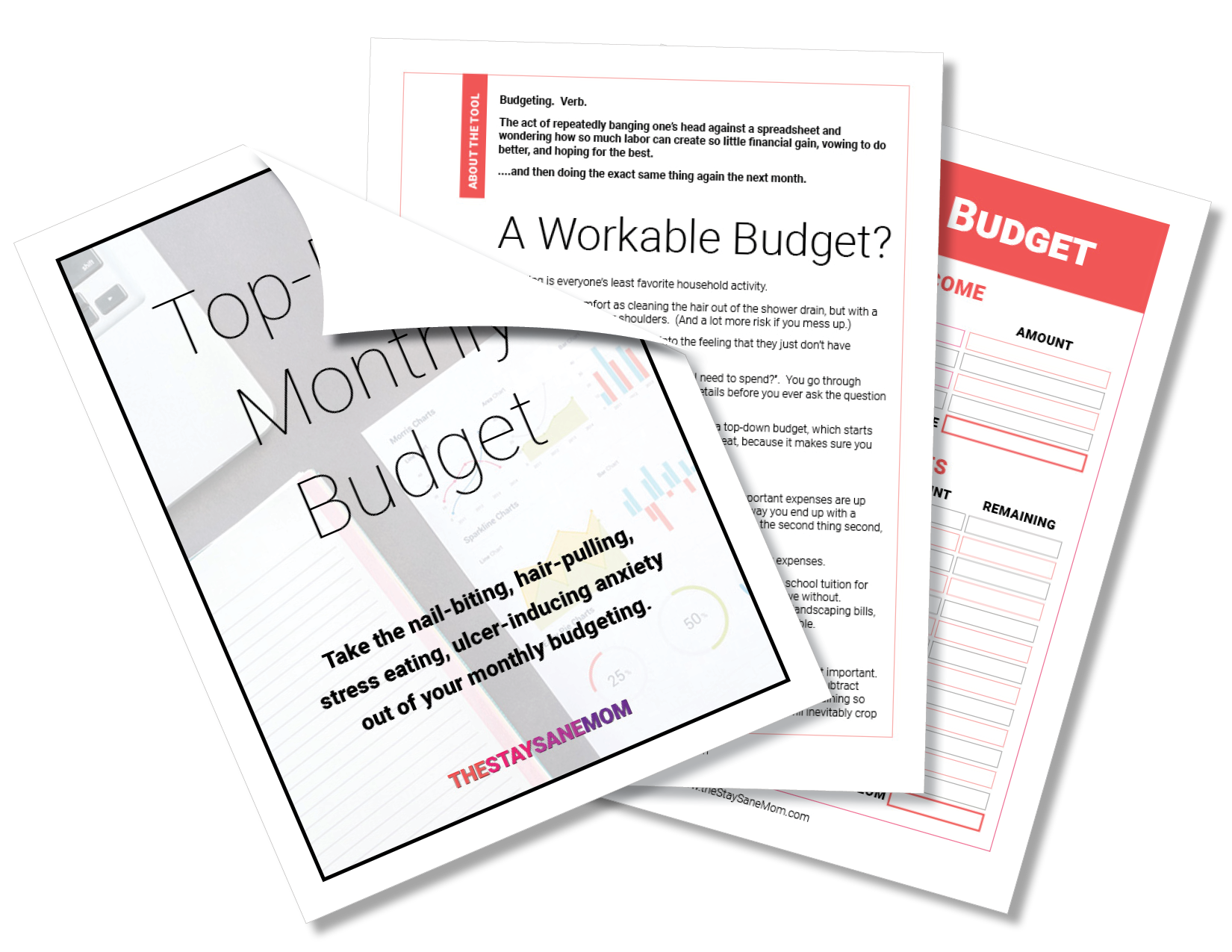Top 10 Financial Habits for Moms

Top 10 Financial Habits for Moms
As the mom of the family, the “financial head honcho” often falls to us. Develop these 10 habits and you'll be in a great position to set your family up for financial security.
Written by Liz Bayardelle, PhD | See Comments | Updated 08/23/2019
Want to cut to the chase?
Failproof Monthly Budget

Top 10 Financial Habits for Moms
This post contains some affiliate links for your convenience. Click here to read my full disclosure policy.
It’s safe to say that enjoying a healthy financial life isn’t always guaranteed. As the mom of the family, the “financial head honcho” often falls to us, even if we aren’t the primary bread-winner of the family. (Even more pressure if you are!)
Regardless of your situation, it’s always hard to deal with finances.
No matter who you are or what you background is, we all worry about money. Do we have enough? Can we make more? Are we managing it correctly? And it’s tough.
But at the same time, you’re just trying to stay sane as a mom – and you have a lot on your plate.
So you don’t always have a lot of time to spend on working it all out. You want quick and concrete solutions you can work on and stick to so that you can enjoy healthy finances. Well, you’ve come to the right place.
Here are the top 10 financial habits you can cultivate to help you enjoy a healthy financial life.
#1: Spend Less than You Earn
This is the basic principle behind the concept of living within your means.
If you’re overspending all of the time, then your finances are not healthy. And not only that, but it’s going to get you into debt. This will affect your financial future and probably cause you more stress. So start by only ever spending what you’ve got, and you’ll find that you’re starting to feel healthier already.
(Hint: In order to spend less than you earn, you need to know how much you’re earning. See step three.)
When it comes to spending, the biggest habit is just starting to make sure that you’re conscious about it when you do spend. Whether it’s keeping a written record, using a financial planning app and going over your transactions every morning (which is what I do), or some other method of keeping track, it’s easiest to spend less when you have a way of monitoring what goes out.
Also, while we’re not on the topic, think twice about putting everything on a credit card. One thing that we don’t all think about, but we should, is interest. Because you can end up paying out so much in interest and fees.
#2: Get Out Of Debt
Something really important for you could be that you want to get out of debt.
Do you have a high amount of money on a credit card? Maybe you are living outside of your means? Are your mortgage payments really tough?
Whatever the case, you need to make debt repayment a priority.
Debt is the worst thing for you financially because debt creates more debt and never-ending calls from a collection agency. The more time you spend in debt, the harder it is to get out. Even look to someone like McCarthy Debt Settlement Attorney if you’re struggling.
Whatever you can do to get (and stay) out of debt, the better.
#3: Create a Budget
It’s also essential for you to think about how you can make sure that you are fantastic at budgeting if you want to enjoy healthier finances.
Okay...is fantastic a stretch? Let’s try “have a budget that is a budget”...is that better?
Benefits of a Budget: You need to budget if you want to be able to control our finances. Because controlling your finances leads to financial success and wealth. Creating a budget will help you to channel your money in the most efficient ways. You’ll then have a better chance at reaching your financial goals, like buying that house. So make sure that you have a budgeting system in place, and you’ll feel much healthier.
Need Help Creating a Budget? This post on how to create a top-down budget walks you through the exact steps of creating a budget that looks at your income first and then plans your expenses from there. (If that sounds familiar, it’s what we talked about in Step 1.)
Cut to the Chase: If you know what you’re doing and just want the goods, here’s the free Google Sheets spreadsheet that’s preformatted to help you create a budget as easily and quickly as possible.
#4: Plan for the Unexpected
There seems to be an unwritten rule of finances where the second you have a perfect budget, something will inevitably pop up.
Your kid will need braces. The dog will eat a basket of golf balls and have an unexpected vet bill. Your property tax bill will come due. No matter what it is, it’s always unexpected, irritating, and completely outside of your budget.
My husband and I call this planning for “the one thing”, because there always seems to be just one more thing.
And this is where I recommend setting up a yearly expenses savings account. I go over exactly how to do this in this post on how to actually hit your budget (or you can just get the free Google sheets template here). Basically this entails saving a little extra every month into an account that stockpiles money that can take care of “the one thing” when it rears its ugly head. Then when your dog starts spewing golf balls (yes, that one is a true story), you can take the money out of your preplanned savings account without breaking your carefully-crafted budget.
#5: Build A Safety Net
And now you need to make sure that you have savings. If you don’t have much money saved up yet, then it could be time for you to change that. Because you need to think about saving a percentage of your income each month for your own safety. Work out how much you can put aside, and make that a priority – because it’s good to have money to fall back on.
#6: Set Goals & Priorities
Next, you need to make sure that you’re setting financial goals for yourself and your family. And be smart about it.
Most of finances are about trying to just not go negative, but once you reach the “stasis” point (where you aren’t going into debt) you’re still only halfway there.
You want to start building savings accounts, creating a financial buffer, and saving to actually enjoy your future. Think about what your family wants in the long term (College? Travel? Family activities?) and create a financial plan to get there.
#7: Plan for the Waaay Future
From here, you’ll then want to think about how you can make plans for your retirement.
Because the future is always looming, it’s just so important for you to care about how you will live in the future today. If you don’t, you won’t have any money!
For this, you may need to talk to financial planners and experts. You need to know that you’re covered in the future, so that you can enjoy life in your sixties and beyond. You may even want to work on planning your estate, just in case too!
Yeah, “estate planning” is the fancy way of saying “go to the most depressing meeting you’ll ever have and make sure your kids will be all set if you (and your spouse) get hit by a bus”. Morbid? Yes. Necessary? Unfortunately, yes.
#8: Buy A House
It’s safe to say that buying a house can seem impossible when you’re not doing well.
However, buying a house is the best thing you can do if you want to build equity (basically a house is like a savings account you live in) and avoid pouring money down the drain every month by renting.
You can do it if you really want. You have to save for a huge downpayment, but just need to make it a priority. So think about how you can start to save money each month, to be able to get that hefty sum together in a set amount of time.
Whether it’s a year or five, go for it!
#9: Aim to Invest
When your savings are in place and you’re working on your retirement, you should then think about growing the money you’ve got.
Instant access savings may not give you the best return, even if you have a lot in there. So why not make a more longer-term investment that’ll pay you much better? You could look at tying the money up or investing in the stocks to really start growing your wealth. Yes, this can be scary when you’re new, but you just start off small.
Remember, investments aren’t just for rich people – everyone has to start somewhere.
#10: Always Aim For Security
And finally, you’ll want to make sure that security is always your top priority.
Yes, you can have this with investments, but also it’s often important to be as safe as you can here. Don’t go too crazy with your investments, or spend too much. It’s all easily done. But, if you know that you want to enjoy a healthy financial life, you have to be smart about things.
Have those instant access savings, live-debt free, for goodness’ sake make (and stick to) a darn budget, and you’ll always have the financial security you need in life.
Start Your Next Step
Failproof Monthly Budget

Get Sanity, Delivered to Your Inbox.
Care to Share?
About the Author

Liz Bayardelle, PhD
Founder | Contributor
Liz (or Dr. Mommy, as her toddler started calling her after learning what a PhD was) is the happily sleep-deprived mom of a toddler (and professional raccoon noise impersonator), a sparkle-clad kidnado, a teenage stepdaughter, 200 cumulative pounds of dog, and herd of dustbunnies (if daily vacuuming doesn't occur). During nights and naptimes, she uses her PhD in business psychology as an author, speaker, and consultant. She also serves as an executive and principal for three companies, two of which she co-founded with her very patient (and equally exhausted) husband.





-Budget.jpg)